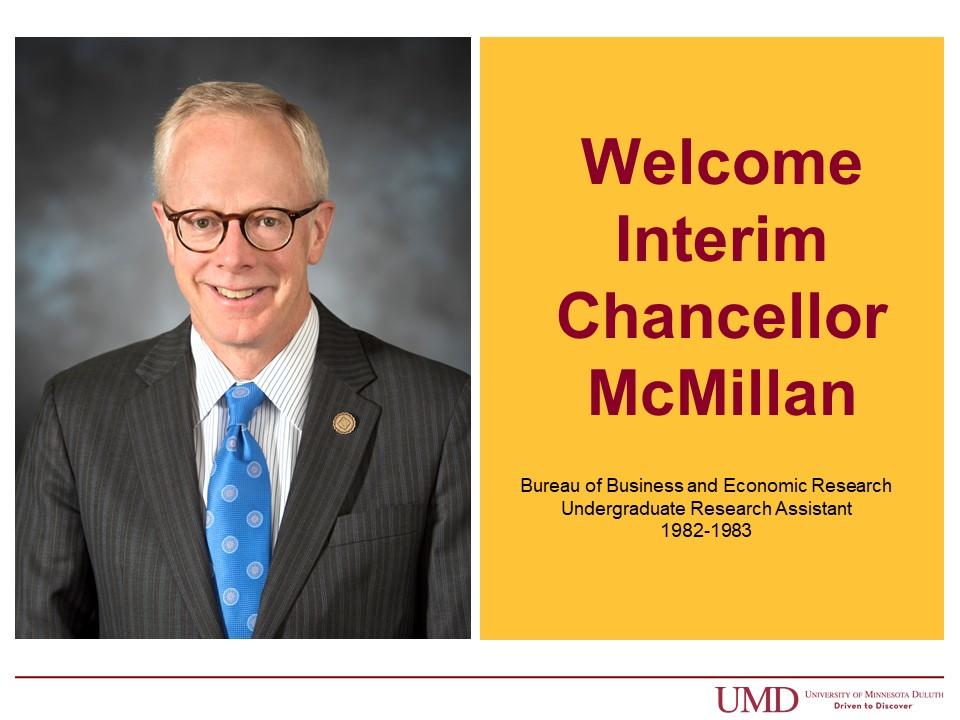David McMillan and his start at the Bureau of Business and Economic Research.
David McMillan stood on giant piers of steel that stretched out into the St. Louis River and looked over Duluth and Lake Superior. He was on top of the Canadian National Railway (CN) ore docks. A few feet from him were the train tracks and hundreds of feet down below him was the berth where the 1,000-foot ore carriers received their loads.
When the CN offered McMillan and the Saint Lawrence Seaway Development Corporation (SLSDC) a tour of the docks, he jumped at the opportunity. “I've driven under the railroad tracks that lead to the docks hundreds, maybe thousands, of times and always wanted to get up there,” he says. From that high vantage point, it seemed that the history of the region played out before him … the mines, the railroads, the docks, the ships…. forestry, wood pulp, and wood product plants… and all the jobs and people that held it all together.
BBER and UMD
McMillan, a UMD 1983 alumnus and member of the University of Minnesota Board of Regents, came to UMD from the Twin City suburbs in 1979 to study economics and history. In his senior year, he joined the Bureau of Business and Economic Research (BBER) as a student researcher. The job fit with his interest in economics. He worked with Professors Jerrold Peterson and Richard Lichty, and other members of the Economics department faculty, on an input/output model, measuring regional economic activity, among other projects.
He found the work fascinating. “It gave me a really good grounding in the area’s resource and service driven regional economy,” says McMillan. They did studies on the indirect and direct output of manufacturing and paper mills. And the models led to actual projects. “The Louisiana Pacific plant outside of Two Harbors, that produces wood trim and siding, came out of that research,” McMillan says. He found delight in the formulas. “X amount of capital investment is likely to create X amount of jobs; I just love that stuff,” he says.
Petersen and Lichty encouraged McMillan to look at a Ph.D. and a career in academia, but there was a stronger field calling, the practice of law. McMillan applied for several law schools and got into a few.
He anticipated the final word about his start date from his number one choice, the University of Minnesota, where he was on the waitlist. That’s when things got interesting.
Peterson and Lichty were so impressed with McMillan’s work as a researcher, they offered him a one-year term faculty appointment as research fellow. The law school wait-list uncertainty made McMillan take the job offer seriously. There was one more factor to consider, McMillan had started spending time with Cari Charboneau, his future wife, and she was going to be in Duluth until her graduation the following year. “All the priorities changed,” says McMillan. He accepted the BBER offer.
Back in Duluth
After law school in Minneapolis, McMillan joined the legal team at Minnesota Power and then began his adventures as an executive of Minnesota Power. In 2011, he was elected to the University of Minnesota Board of Regents. Over the course of his career he has served the community. McMillan currently serves as chair of the SLSDC Advisory Board and previously served as the board chair of the Minnesota Chamber of Commerce, UMD's Natural Resources Research Institute, the Area Partnership for Economic Expansion, and Goodwill Industrial Vocational Enterprises. He is also a past member of the Duluth Entertainment Convention Center's Board of Directors and the Board of Directors of St. Luke's Hospital.
“If the BBER funding had not occurred back in 1983, I don't know what direction my life would have taken,” McMillan says. “It certainly wouldn't have revolved around resource-based industries and the economic impact they have on northeastern Minnesota.”
He calls it a “full circle.” He and Cari agree, “We’re blessed to call Duluth home.”
To read more about the history of the BBER click here.
